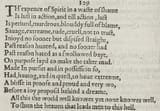Search Results
7/10/2025, 3:23:53 PM
>>24537087
The changes in the modernisation of this poem actually do some damage (especially the punctuation): not only to the personal atmosphere of the poem but the meaning itself.
A semicolon after the first action instead of a comma gives a longer rest than Shakespeare gave; but it also cuts off the idea at action instead of keeping in action and till action together as well as the two lust's. A comma after bloody separates it from full with which it really forms a single word meaning 'full as with blood.' Next come several semicolons for commas; these introduce pauses which break up the continuous flow of ideas (if Shakespeare had wanted such pauses he would have used semicolons as he does elsewhere). In the original there is a full stop at mad, closing the octave; in the revised version a colon is used, making the next line run right on and causing the unpardonable change from Made to Mad. Made logically follows from make of the preceding line: ‘to make the taker mad, Made (mad)' but it also returns to the general idea of lust.
The changes in the modernisation of this poem actually do some damage (especially the punctuation): not only to the personal atmosphere of the poem but the meaning itself.
A semicolon after the first action instead of a comma gives a longer rest than Shakespeare gave; but it also cuts off the idea at action instead of keeping in action and till action together as well as the two lust's. A comma after bloody separates it from full with which it really forms a single word meaning 'full as with blood.' Next come several semicolons for commas; these introduce pauses which break up the continuous flow of ideas (if Shakespeare had wanted such pauses he would have used semicolons as he does elsewhere). In the original there is a full stop at mad, closing the octave; in the revised version a colon is used, making the next line run right on and causing the unpardonable change from Made to Mad. Made logically follows from make of the preceding line: ‘to make the taker mad, Made (mad)' but it also returns to the general idea of lust.
Page 1
